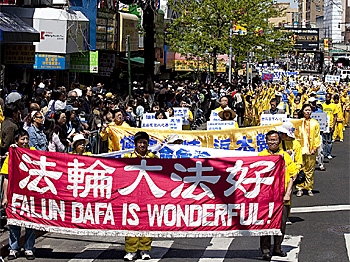Report Sheds Light on China’s Largest Persecution
The persecution of Falun Gong adherents and their peaceful resistance within Mainland China continues unabated.

Falun Gong practitioners walk in a parade in New York City commemorating the eleventh anniversary of the peaceful appeal made by practitioners in Beijing on April 25, 1999. Edward Dai/The Epoch Times
|Updated:





